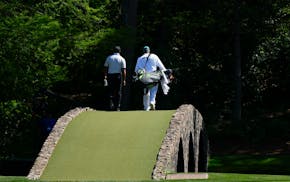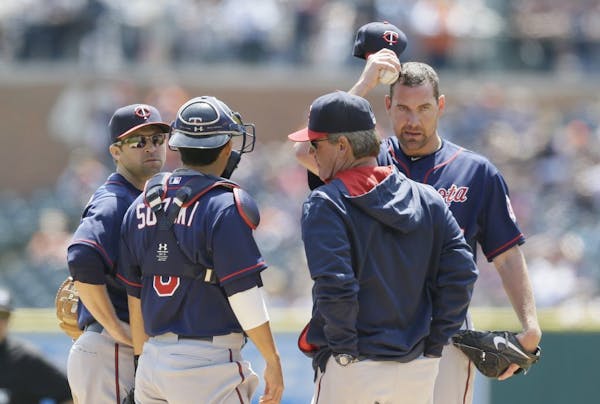At the end of the 2007 season, Torii Hunter was 32. He had produced a career-best 107 RBI for a team that otherwise had trouble scoring runs.
The Twins made Hunter contract offers that left him with the clear understanding that the franchise didn't value him as a star player. He signed with the Angels.
In the spring of 2010, Joe Mauer was 26. The previous season, he had earned the American League MVP award by performing like a power hitter for the only time in his career. He had grown up in St. Paul, had been chosen with the first pick in the draft by his hometown team and had won three batting titles as well as the MVP award. Presuming good health, he was on his way to the Hall of Fame.
The Twins did what they had to do: Signed him to an eight-year contract worth $184 million as they entered a new ballpark.
The Twins' view of Hunter was based in logic. He was an older player who regularly ran into fences and might not last much longer in center field.
The Twins' view of Mauer was based in logic, and public relations. He was a great player and local boy in his prime coming off a career season and preparing to christen a new ballpark that, it seemed, would one day feature a statue of him.
Hunter was destined to move to a corner outfield spot, where the Twins seemingly had many other options and prospects. Mauer was a rarity: a great-hitting, great-throwing catcher who was also an excellent base runner.
As the Twins return to Target Field for a weekend series, they are surprisingly competitive. This has more to do with Hunter's return to the team than Mauer's ongoing presence. Given how the two have performed since Hunter left the franchise, maybe we shouldn't be surprised.
Since the start of the 2008 season through the end of 2014 — meaning his aberrant 2009 season greatly aids his totals — Mauer has averaged 126 games, 11 homers, 68 RBI, a .321 batting average and an .863 on-base-plus-slugging percentage. This season, his OPS is .719.
From 2008 through 2014, Hunter averaged 143 games, 20 homers, 86 RBI, a .289 average and an .805 OPS.
In short, the older player known for running into fences has been more durable and productive. Both have moved from prime defensive positions to corner positions, with Hunter playing right field and Mauer playing first base.
Mauer has a clear advantage over Hunter in only one area — on-base percentage. Mauer's ability to hit for a high average and willingness to draw walks gives him an advantage of .404 to .345 in that category. (Hat-tip to vigilant reader John Eide for highlighting the comparison, and to baseball-reference.com for the raw numbers.)
In addition to being more productive, Hunter was and is the more inspirational clubhouse figure, a player who takes pride in making those around him better.
From 2008 through 2015, Hunter has made $126 million in salary. He would have signed with the Twins for less than he received from the Angels, so it's possible that, had he stayed with the Twins, he may have cost them closer to $100 million or $110 million for the past seven-plus seasons.
Since the beginning of the 2008 season, Mauer has made $144.25 million. (Salary totals include 2015 payments, which are guaranteed.)
The Twins owe Hunter nothing beyond this season. They owe Mauer $69 million over the next three seasons.
Mauer's value has been hurt by injuries, especially the concussions that forced him to stop catching. Even as a catcher, he probably would not have been nearly the value that Hunter has been, as a player and a leader.
The Twins thought they could afford to lose Hunter and that they couldn't afford to lose Mauer. Both judgments were based on age, logic, scarcity and statistical profiles. Both were understandable at the time.
Here's why general managers tend to wear disguises in public:
The old, beat-up outfielder turned out to be a far better bargain than the local hero on his way to the Hall.
Jim Souhan's podcast can be heard at souhanunfiltered.com. On Twitter: @SouhanStrib. • jsouhan@startribune.com

Souhan: This is KAT's chance to prove Flip Saunders was right

Souhan: Why Tiger Woods should keep swinging
Souhan: Scheffler wins Masters again, shows what makes him special
Morikawa falters in final round at Masters


